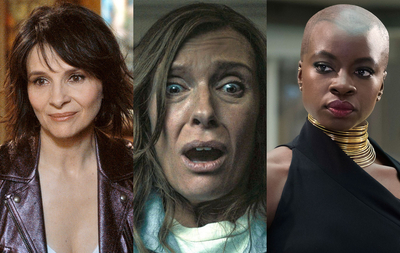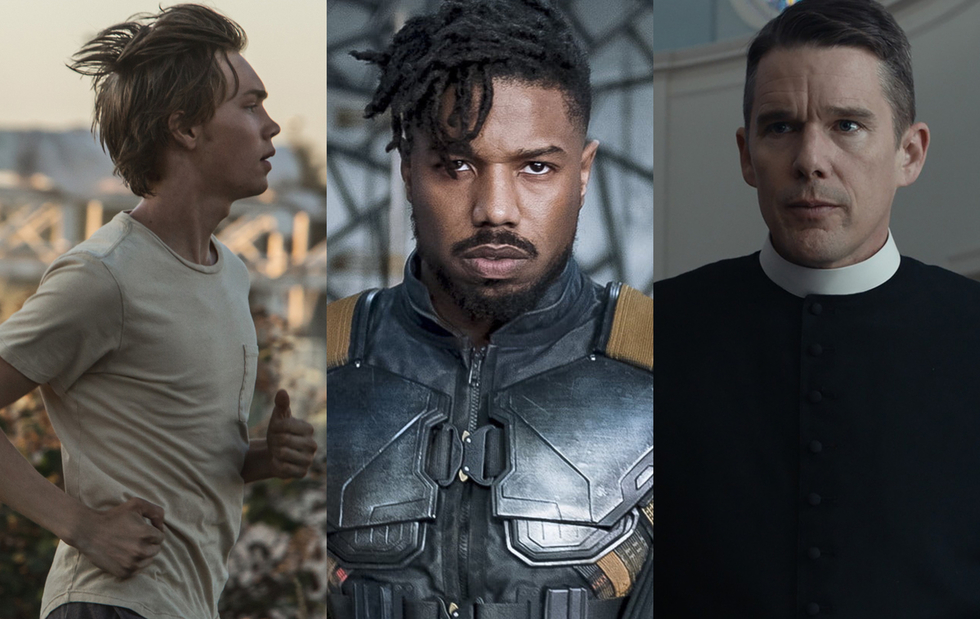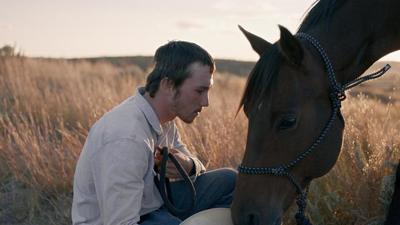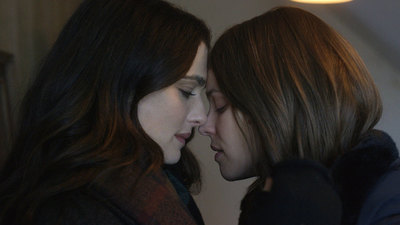
BY MATTHEW ENG |
The 11 Best Male Film Performances of Early 2018
These screen performances may have debuted during the first half of 2018 but their achievements deserve to be discussed and remembered all year round.

This year at the movies, some of our most celebrated actors have risen to new peaks in careers that span numerous genres, decades, and individual eras of stardom, while some of our more underrated performers have moved to the center in projects that showcase something close to the full breadth of their capabilities. Of the 11 actors featured on this list, three are making their professional acting debuts for directors who embody the true spirit of independent cinema and have brought their performers' unusual gifts and, in two cases, real-world experiences to the big screen. 2018 has been a varied and frequently rewarding year for film but particularly film acting, whether it’s familiar faces confidently testing out new personas or first-timers showing us characters we never thought we’d meet as they carry us to corners of the world that the movies themselves seldom ever visit.
Here, then, are the 11 best male performances from films that received theatrical runs during the first half of 2018:

Vahid Aghapoor, Ava
We’ve seen the archetype of the frowzy, tongue-in-cheek, and lovingly conspiratorial dad in so many coming-of-age movies, sometimes played wondrously (i.e. Tracy Letts in Lady Bird, Daniel Stern in Whip It, J.K. Simmons in Juno) but just as often played on autopilot, which is why Vahid Aghapoor’s performance in Sadaf Foroughi’s Ava is such a great reversal of this quasi-cliché. As the nameless father increasingly flummoxed by his uncontrollable daughter’s roughening edges, Aghapoor keeps his character housed in a place of exquisite ambiguity. His character may defend his daughter against school administrators and her highly-critical mother with a rough and fiery intensity, but Aghapoor’s understatement and clammy demeanor around Ava in surrounding scenes avoids turning this man into our young heroine’s biggest champion; for every word of reassurance he doles out to his daughter, there’s another of bruising and impatient disapproval. If you look closely into Aghapoor’s wounded, drooping eyes, whether his character is reprimanding Ava or cruelly extending the unbreachable chasm that has long existed between him and his wife, you can see the agony of a man both pathetic and plaintive, a patriarch stuck in a role he perhaps never aspired to fulfill. Aghapoor plays something far tougher than the doting dad we are accustomed to, and, in doing so, unearths the kinds of deeper, unpleasant truths about familial love and devotion that so many actors — and filmmakers — flinch at.

Daniel Giménez Cacho, Zama
From the very first shot of Zama, writer-director Lucrecia Martel establishes a tricky surrealist tone that lives or dies on the efforts of the leading man stuck at the center of this masterfully-made satire of government ineptness and colonialist pride in seventeenth century Paraguay. As Don Diego de Zama, a minor bureaucrat in the Spanish army awaiting an indefinitely-postponed reassignment to Buenos Aires, actor Daniel Giménez Cacho understands and abides by the unassuming deadpan of Martel’s approach with interminable devotion. Cacho possesses one of the most formidably unrelenting poker faces ever seen on the big screen, and his ability to sustain this grim expression throughout the entire picture, even as Zama encounters any number of thorny setbacks that might inspire a lesser actor to simply blow his top, is a sublime achievement unto itself. Although Zama is Martel’s chosen point of fascination, Cacho recognizes that the character is inevitably a hapless symbol for a larger ordeal. Zama may be a trivial figure within his chain of command, but Cacho doesn’t mistake him for a dunce and refuses to condescend to his preposterous setbacks by opening up his playing, which subtly and drolly brings to mind what it feels like to be this man here and now, to any inordinate comic buffoonery. Instead, he constantly maintains his rigid mask, which flushes with anger but never lets any clearer emotions pass, creating space in the performance for Martel to weave in her own commentary about the unchecked arrogance that rots the minds of men like Zama, then destroys them.

Fernando Cardona, En el Séptimo Día
Jim McKay’s egalitarian, micro-budgeted filmmaking always leaves room for pockets of lovely naturalistic acting from the frequently untested actors who populate his profoundly humane New York portraits. En el Séptimo Día (On the Seventh Day), McKay’s long-delayed return to narrative cinema, follows José, a Mexican immigrant working as a deliveryman for a Brooklyn restaurant who struggles to balance the demands of the precarious job that supports his faraway family with his desire to play soccer. In his first screen credit, nonprofessional performer Fernando Cardona feeds off of McKay’s boundless attention (the actor appears in nearly every scene and is often photographed in close-up) to show us a hawk-eyed man endlessly alert to the world around him, which functions as a cautionary consequence of the character’s undocumented status and a vital component of José’s personality. Cardona may show occasional signs of greenness, but his fundamental alertness makes him an ideal subject for the camera; he’s a charismatic and naturally sensitive soul who can’t help but react, even in the most understated ways, to the delights and dilemmas that he encounters on the streets, in the kitchen, and on the field, and we, in turn, can’t help but sympathize with him. McKay puts his actors at ease, never forcing them to exert themselves beyond the bounds of reality, and so he is content to let Cardona act with the unvarnished simplicity with which we all privately behave in our daily lives, unclouded by self-consciousness. His star’s relative restraint later becomes an asset, helping to smooth some of the plot mechanics that the writer-director employs in the film’s climactic passages. But this restraint also fosters a private world for José, an inner self not completely accessible to the audience, which is an effect that so many performers strive to convey. By keeping some of the character to himself, Cardona endows his gracefully self-contained performance with the dimension and dignity that many like José are being routinely dispossessed of by those who deny the compassion that fills every frame of McKay’s everyday dramas.

Ben Foster, Leave No Trace
As the PTSD-stricken war veteran teaching his teenage daughter an odd though honest existence in Debra Granik’s Leave No Trace, Ben Foster offers yet another vivid reminder that he is an actor of tremendous power and eloquence. As in The Messenger and Hell or High Water, the emotional candor of his playing, which oozes the rugged intensity of Brando but on a more muted, naturalistic register, keeps our eyes fixed to the screen whenever he appears. Foster presses us to not just watch but watch carefully for a spare reaction or unexpected movement that may tell us more about a character whose backstory is teased out but never fully explicated. Like Granik, the actor refuses to romanticize the nonconformist streak that keeps the clearly disturbed Will untethered to any home-base and threatens to drive a permanent wedge between him and the daughter, beautifully played by Thomasin Harcourt McKenzie, that he loves but cannot live for. Instead, Foster keeps the character’s core cryptic so that Will’s deeper motivations are uncertain, even when his feelings are readable. There remains an underlying part of Will that is inaccessible to us at all times, which makes him a far more interesting figure than the proud, open-book individualist that a lesser actor might have been eager to mold from this material. By preserving Will’s secrets and playing against the expectations of a typical arc, Foster gives the transfixing and irresolvable performance that Granik’s true-to-life filmmaking merits. He embodies the rebellious, shell-shocked soul of a man we perhaps never really knew but cannot possibly leave behind. Even as Will continues again down his own isolated path in the film’s final moments, Foster may be out of sight but never entirely out of mind.

Hugh Grant, Paddington 2
Who knew that beneath the perpetually floppy head of hair that made Hugh Grant such a sudden and surprise star in the mid-nineties lurked the buffoonish streak of a certified merry jester? And who could have predicted that this waggish persona, so dissimilar from all the stuttering fuddy-duddies and rakish man-children of his rom-com days, would unveil itself in the unabashedly adorable sequel to a children’s movie about the misadventures of a talking bear? Grant appears to be having a field day as Paddington 2’s artfully bonkers villain, the preening, over-the-hill actor-turned-burglar Phoenix Buchanan, seizing upon his ample screen time to run the entire gamut of comedic clownery and calling upon a full-bodied versatility that even the funniest of his previous star vehicles have seldom showcased. The actor contorts his face like a rubber mask, plows through an array of finely-tuned stage accents, and dons unsightly disguise after unsightly disguise, all in the name of vandalizing the highly revered, painfully self-serious figure of the Great British Thespian. Grant proves himself a merciless yet joyful parodist who keeps his every scene moving at a buoyant pace, making the movie a breezy delight for its young viewers while simultaneously teasing the brains of the adults who not-so-secretly adore this series just as much as those within its target audience. From its first gag to its tap-happy finale, the performance remains so invigorating and so specific to the assignment at-hand that it makes one wonder why Grant waited so long to show off this bag of tricks in the first place — and what other skills might be hidden within it.

Ethan Hawke, First Reformed
Ethan Hawke could have easily spent this latter half of his career dining out on his status as the paradigmatic Gen X actor, playing innumerable manifestations of the scruffy, self-conscious chatterboxes that brought him to prominence in films by everyone from Ben Stiller to Richard Linklater to Andrew Niccol. But Hawke’s talents — including his capacity for muting his identity and disappearing into a role — have evolved beyond measure in the past decade, a direct result of this performer’s bold willingness to place himself in seemingly any acting challenge he sees fit. Somewhere between Before Midnight, Boyhood, Born to Be Blue, and Maudie, Hawke became not simply one of the greatest living actors of his generation, but one of our greatest living actors, period. There is no finer evidence of this development than Paul Schrader’s First Reformed, in which a brooding, bristling Hawke delivers what might rightfully be considered the performance of his career as Ernst Toller, an introspective pastor unable to perform the rites and responsibilities of his role in the face of the world’s man-made atrocities. Centered at all times in Schrader’s soul-sick reckoning, Hawke is a corker of accelerating tension and spiritual unrest, carrying himself with the focused yet disintegrating self-possession of a man fighting and failing to bury his fury below the surface. Hawke sculpts his performance with the eye of the viewer in mind, requiring us to scan his captivatingly dour face for the slightest hint of a sea change in Ernst; he makes a split-second grimace or the widening of his scared eyes just as consequential as the character’s cries for help. Every single frame of Schrader’s film is improved by Hawke’s unwavering commitment and quietly exercised mastery, the traits of an an actor who has found his fullest, truest creativity in front of the camera, for all of the filmgoing world to see.

Brady Jandreau, The Rider
Skeptics might grumble that because ex-rodeo star Brady Jandreau has actually endured the physically and psychologically agonizing setbacks chronicled in Chloé Zhao’s The Rider that his star performance in this cinematic narrativization is not really a performance at all. Looking beyond independent cinema’s rich and rewarding history of employing nonprofessional actors, oftentimes in roles not far removed from their own lived realities, the emotional force of Jandreau’s front-and-center participation in this new American masterpiece could have only derived from a performer of obvious smarts and soulfulness. In recreating his own traumatic journey from superstar of the ring to reluctant retiree, Jandreau delineates identifiable moments by which to chart his character’s transformation, bringing his emotions to the fore in certain moments while elegantly letting them subside in others. He makes clear-cut choices about how to react in scene after scene, and by allowing this decision-making to oftentimes play out over the course of a single shot, and thus remain visible to the naked eye, Jandreau, in tandem with Zhao, shows us the inner tumult of a man who must choose between a perilous life of fame and fans or a modest, more responsible but no less important existence. How exactly Jandreau reached these heights may not always be clear, but what matters is that he reached them and, in doing so, supplied Zhao’s unique creation with the unbearably tender and ever-transparent performance it needed. After all, what difference does the divide between truth and fiction make when the tears this atypical actor sheds are as real and affecting as the complex heartbreak they evoke?

Michael B. Jordan, Black Panther
Whenever Michael B. Jordan strides into Ryan Coogler’s Black Panther as the militant, malevolent Erik Killmonger, his hard, looming, and mutilated figure serves as instant notification that the movie we are now seeing is no longer the one we were just watching. Jordan’s very presence, a veritable magnet for the camera, can change the entire direction and tenor of a scene, establishing then escalating the film’s stakes through the intoxicating vigor of the actor’s physical persona, which seethes with indignation. The narrative purposes of the superhero movie, even one as path-breaking as Black Panther, require that Killmonger play the part of supervillain, but Coogler never restricts the character’s humanity, and neither does Jordan. Together, in their third collaboration, actor and director are united in endowing Killmonger with a flawed yet unyielding conviction that prohibits us from writing off the radical beliefs and means of liberation that the character advocates. By taking Killmonger’s principles so seriously, Jordan and Coogler push us to consider this polarizing figure on a deeper level and wrestle with the viewpoints he so pungently pronounces, without ignoring the often treacherous wrongs he commits throughout the movie. Jordan, for his part, has considered and incorporated every element of the character into his performance, leaving no stone unturned and offering something close to a prismatically-realized antagonist. Many an actor could have risen to the occasion of the fight scenes that depict Killmonger’s violent, short-lived ascendancy, even though the seeming effortlessness with which Jordan carries himself through these strenuous clashes is woefully underrated. Just as indelible, though, as the brawn and brutality of Killmonger is the eternal heartache of the debased boy he once was, the child who was left behind, robbed of a father and a homeland, a past that Jordan’s raw grief refuses to let us forget. When the character chooses death over bondage in his final scene, Jordan smites away any and all offerings of reconciliation, denying the movie the tidy moral certitude that a villain’s demise usually conveys. Killmonger may be gone, but his fire still burns.

Meinhard Neumann, Western
Meinhard Neumann had never stepped foot in front of a camera before writer-director Valeska Grisebach discovered the former amusement park worker at a horse auction and tapped him to star in Western. Grisebach’s superb drama reworks the archetypes and devices of the titular genre to tell the tale of Neumann’s German construction worker and onetime legionnaire, also named Meinhard, who finds himself breaking with his fellow laborers and befriending the villagers of the Bulgarian town the men have been tasked with industrializing. With his ramrod posture, unanxious gait, and stern yet never invulnerable countenance, Neumann functions as a contemporary callback to cinematic cowboys like Gary Cooper and Henry Fonda, his character a rugged self-creation who aspires to a level of masculine gallantry of which he can only fall short. Neumann’s minimalist triumph is further enriched by a latent longing for closeness — in forms friendly, romantic, and sexual — that the actor reveals with the slow, unforced beauty of a flower in bloom. Neumann may be new to the medium of film as well as the particular art of acting practiced within it, but he understands how the latter craft can be finessed in the eye of the camera to keep moviegoers engrossed. He holds us utterly rapt and does what all actors aspire to do, which is suggest a full life that exists beyond the parameters of the screen. And it’s the suggestion of this off-screen world that keeps us glued to every minute yet meaningful move in Neumann’s embodiment; we are filled with an urge to see more of him and take in as much of his being as we can, foolish with the hope that such contact will somehow allow us to at last know the unknowable.

Alessandro Nivola, Disobedience
The finest of Alessandro Nivola’s expert performances feel like tiny revelations about how to play familiar types without bogging oneself down in bald clichés, whether the characters are debauched rock stars (Laurel Canyon), prodigal sons (Junebug), surgical geniuses (Broadway’s The Elephant Man), or slick Svengalis (his near-cameo in The Neon Demon). Nivola’s ingenuity is utilized to its fullest capacity in Sebastián Lelio’s Disobedience, in which the actor’s up-and-coming rabbi Dovid watches as his cherished wife Esti (Rachel McAdams) breaks with the ultra-Orthodox faith that first pushed them together. The empathy of Disobedience’s storytelling ensures that every character is granted the same measure of clearsighted understanding, which means that Dovid is neither a villain nor a cuckold, but a fully-dimensional human being whose crestfallen coming-to-grips matters just as much as Esti’s courageous evolution. Nivola pushes his performances one step further by preventing the character from being defined by any lone trait, ultimately playing a man of faith who is also a sympathetic peacemaker, an ardent scholar, an infatuated husband, an unabashed sensualist, and, finally, an open-minded risk-taker, capable of seeing past the outrage that Nivola earlier kept at a simmer. The actor exposes this all to us without a single flashy, self-serving gesture in sight, his touch as organically and enthrallingly reserved as the film itself. He makes us aware that the poignant, mindful delicacy with which Dovid slackens his body and softens his voice could only belong to a man who longs to be loved in the same way he himself loves. Nivola remains the very best kind of character actor: a self-effacing chameleon who makes himself indispensable to directors and co-stars alike by honoring the emotional intricacy of his characters above all else.

Charlie Plummer, Lean on Pete
Like the larger film that surrounds and enables it, Charlie Plummer’s performance in Andrew Haigh’s Lean on Pete is a tour de force of hushed tones and inner turmoil made flesh and bone. More than sixty years and over a hundred projects may separate the teenage Plummer from veteran actress Charlotte Rampling, but what the younger virtuoso achieves in Lean on Pete is a feat on par with Rampling’s career-defining work in Haigh’s previous 45 Years. On paper, their characters could not be more dissimilar: one a homeless runaway seeking solace and succor with a stolen horse across the Pacific Northwest, the other a retired teacher forced to reevaluate her marriage and picturesque middle-class existence in the English countryside. But both rely on similarly contained inside-out approaches, inhabiting and burrowing into their roles, looking not for Big Moments with which to show off their abilities but a sustained emotional throughline that will credibly carry these characters from one scene to the next. As Plummer’s Charlie transforms from a buoyant innocent to a traumatized survivor who has witnessed and committed brutal acts, the actor signals an entire transformation at his own confident pace, through the smallest of gestures, which implore us, as viewers, to lean in and examine the magnitude of his restrained choices. Plummer has been acting professionally for just under a decade, but his talents, prominently displayed in nearly every frame of Haigh’s film, evince an astonishingly advanced understanding of the art of screen acting, in which even the most infinitesimal crinkle in a performer’s expression can convey a tectonic shift in a character’s state of mind. Even more than Haigh’s gorgeous images, it is Plummer’s face we search to understand the story unfolding before our eyes, as well as its intrinsic pathos. When several of those closest to Charlie break faith with him, Plummer stews with a hurt that practically scalds. When the boy gets an ephemeral taste of down-home comfort or adult approval, the young actor’s face radiates a joy so tranquil and consuming that we dread its disruption. To watch Plummer is to run one’s hand through the crisp, clear-blue waters of a young man's most private and plaintive remembrances, each one held close to his heart and, inevitably, to ours.

